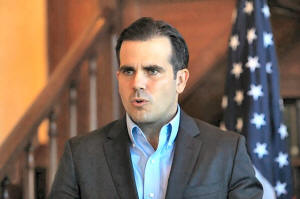|
Puerto Rico's governor presses power
utility privatization
 Send a link to a friend
Send a link to a friend
 [March 06, 2018]
By Luis J. Valentin Ortiz [March 06, 2018]
By Luis J. Valentin Ortiz
SAN JUAN, Puerto Rico (Reuters) - Puerto
Rico's Governor Ricardo Rossello on Monday pressed proposals for
privatizing the U.S. commonwealth's shattered electrical grid as part of
its painstaking recovery from devastating September hurricanes.
Rossello used his State of the State speech to say that he had
introduced an energy reform bill on Monday, while outlining ideas for
cutting taxes, increasing police pay and introducing education reforms.
Hurricanes Maria and Irma killed dozens of people and caused an
estimated $100 billion in damage to a recession-bound economy in which
more than 45 percent of its 3.4 million U.S. citizens live in poverty.
Rossello also repeated his call for the federal government to stop
treating Puerto Ricans as “second-class U.S. citizens” in terms of
disaster relief.

"Disaster response should not be based on the notion of being Republican
or Democrat, but rather on the equal treatment and aid to U.S.
citizens," Rossello said, while recognizing support from New York
Governor Andrew Cuomo, a Democrat, and Florida Governor Rick Scott, a
Republican, who was in Puerto Rico and attended the event.
In January, Rossello announced his intention to sell off the Puerto Rico
Electric Power Authority's power generation assets, and said it could
take about 18 months to complete.
On Monday he said the energy reform bill would "define the process" for
privatized and public-private partnerships (P3s). These so-called P3
projects would shift development costs onto the private sector, and in
return typically would be paid fees from government to manage a
property.
Hurricane Maria took out the island's power. More than 5 months later,
12.5 percent, or 185,200, of customers, do not have electricity,
according to the latest data from the U.S. Department of Energy.
The goal is to reduce Puerto Rico's high energy costs to less than 20
cents per kilowatt hour (kWh). A year ago, PREPA, Puerto Rico's electric
utility, was instructed by the federally appointed Financial Oversight
and Management Board to achieve customer rates no higher than 21 cents
per kWh by 2023.
[to top of second column]
|

Puerto Rico Governor Ricardo Rossello speaks during a Facebook live
broadcast in the library of the governor's mansion, in San Juan,
Puerto Rico January 24, 2018. REUTERS/Alvin Baez

Under a 2016 federal Puerto Rico rescue law known as PROMESA, the
board was given the authority to push Puerto Rico into a
court-supervised restructuring akin to U.S. bankruptcy, which it did
in May as it reeled under $120 billion in combined bond and pension
debt.
The board extended the deadline for certifying the government's
revised fiscal plan to March 30, which Rossello said "should be
approved within the next weeks."
"This plan cannot be merely fiscal; it needs to be transformative
and include the aspirations of our people," he said.
His plan calls for using $18 billion in additional funding from the
U.S. federal budget to turn a deficit into a surplus of $3.4 billion
within six years.
While Rossello has focused on cutting spending by reorganizing and
reducing the size of the government, he is advocating more resources
for police including a salary increase of $1,500 per officer, and
higher pay for teachers.
Rosello also vowed once again to cut income taxes for individuals
and businesses, and reduce sales tax on prepared food. Once
completed, individual taxpayers could see savings from $450 to $950
a year, the governor projected.

(Reporting By Luis J. Valentin Ortiz in San Juan; Editing by Daniel
Bases)
[© 2018 Thomson Reuters. All rights
reserved.]
Copyright 2018 Reuters. All rights reserved. This material may not be published,
broadcast, rewritten or redistributed.
Thompson Reuters is solely responsible for this content. |